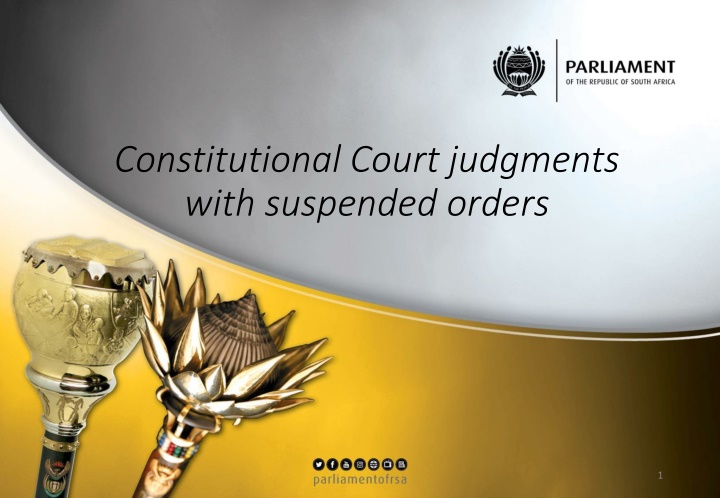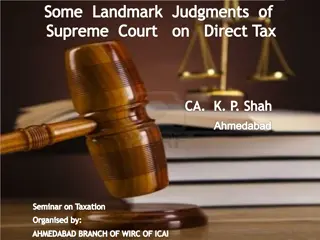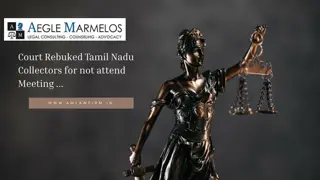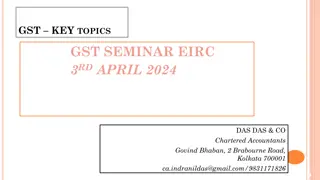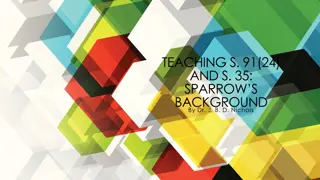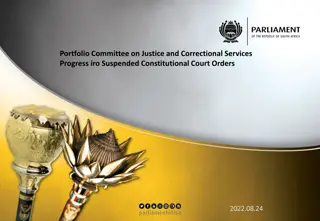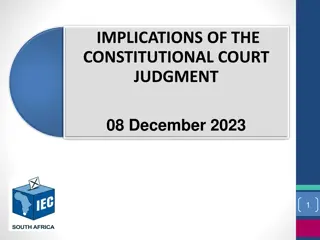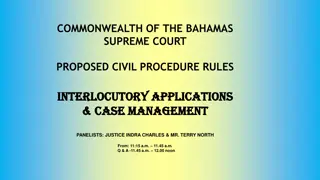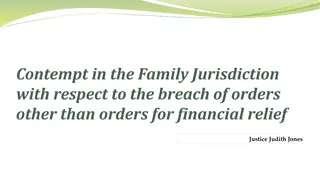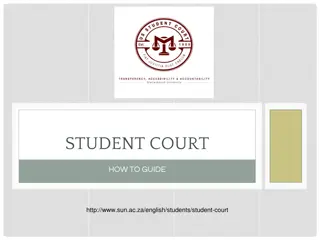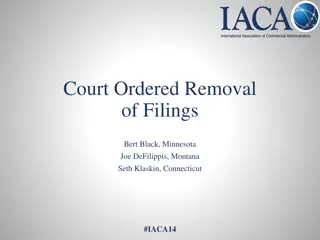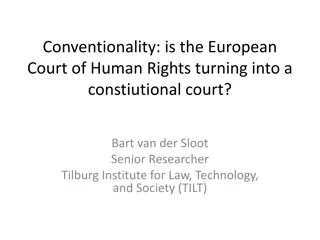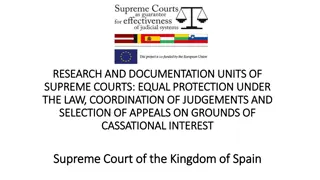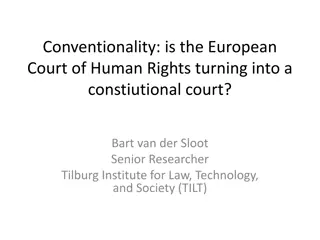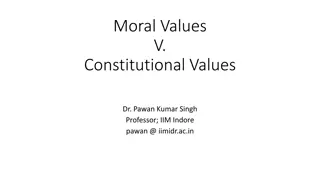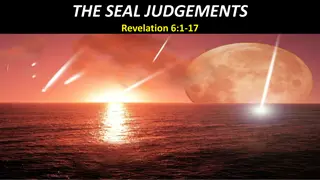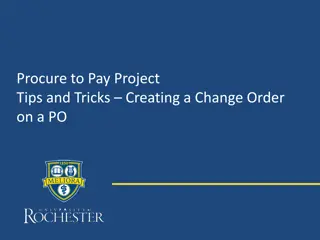Constitutional Court judgments with suspended orders.
The Constitutional Court in South Africa has issued judgments with suspended orders in various cases relating to Acts that were deemed inconsistent with the Constitution. Orders in cases like the Riotous Assemblies Act and Drugs and Drug Trafficking Act are set to lapse on specific dates unless the defects are corrected by Parliament. The judgments highlight the Court's role in upholding constitutional principles and the implications of legislative amendments.
Download Presentation

Please find below an Image/Link to download the presentation.
The content on the website is provided AS IS for your information and personal use only. It may not be sold, licensed, or shared on other websites without obtaining consent from the author.If you encounter any issues during the download, it is possible that the publisher has removed the file from their server.
You are allowed to download the files provided on this website for personal or commercial use, subject to the condition that they are used lawfully. All files are the property of their respective owners.
The content on the website is provided AS IS for your information and personal use only. It may not be sold, licensed, or shared on other websites without obtaining consent from the author.
E N D
Presentation Transcript
Constitutional Court judgments with suspended orders 1
Cases to be discussed Economic Freedom Fighters and Another v Minister of Justice and Correctional Services Riotous Assemblies Act Suspension of the order lapses 26 November 2022 Sonke Gender Justice NPC v President of the Republic of South Africa and Others Correctional Services Act Suspension of the order lapses 3 December 2022 Smit v Minister of Justice and Correctional Services Drugs and Drug Trafficking Act Suspension of the order lapses 17 December 2022 AmaBhungane Centre for Investigative Journalism NPC v Minister of Justice and Correctional Services Regulation of Interception of Communications and Provision of Communication Related Information Suspension of the order lapses 3 February 2024 2
Economic Freedom Fighters and others v Minister of Justice and Correctional Services and others CCT 201/19 Presented by Ms. Daksha Kassan 3
Section 18(2)(b) - Riotous Assemblies Act, 1956 On 27 Nov 2020, the Constitutional Court ( CC ) declared section 18(2)(b) of the Riotous Assemblies Act, 1956 (Act No. 17 of 1956), inconsistent with section 16(1) (freedom of expression) of the Constitution and invalid to the extent that it criminalises the incitement of another to commit any offence . The declaration of invalidity was suspended for 24 months to enable Parliament to rectify the constitutional defect (hence date by which defect to be corrected is 26 Nov 2022). However, the CC did provide a read-in for how section 18(2)(b) of the Act must be read during the period of suspension which will fall away when the defect is corrected by Parliament. The CC also stated that this read-in will apply should Parliament fail to correct the defect by 26 Nov 2022, or within any extended period of suspension. 4
Section 18(2)(b) (Continued) Section 18(2)(b) of the Riotous Assemblies Act states that: - (2) Any person who- (a) .. (b) incites, instigates, commands, or procures any other person to commit, any offence, whether at common law or against a statute or statutory regulation, shall be guilty of an offence and liable on conviction to the punishment to which a person convicted of actually committing that offence would be liable. . 5
Legal challenge The applicants (Economic Freedom Fighters ( EFF ) and Mr Malema) approached the High Court after criminal charges based on section 18(2)(b) of the Riotous Assemblies Act were laid against Mr. Malema by the NPA. The thrust of the charges was that Mr. Malema (based on certain statements allegedly made by him) incited members of the EFF and others to commit an offence of occupying land registered in the names of others without lawful permission or lawful reason. The offence these persons were allegedly incited to commit was said to be trespass in terms of section 1 of the Trespass Act, 1959. 6
Facts (High Court) In the HC, applicants challenged the constitutionality of the Riotous Assemblies Act and the applicability of the Trespass Act. Also sought to have NPA s decision to lay charges set aside. HC concluded that: - The Riotous Assemblies Act actively criminalises conduct that is otherwise protected by section 16 of the Constitution and thus limits the right to freedom of expression. - The limitation was reasonable and justifiable ito s36 of the Constitution the purpose of the section was crime prevention. - Section 18(2)(b) the part that deals with sanction - is constitutionally invalid: it is unreasonable and unjustifiable to the extent that the inciter of an offence is compulsorily liable to the same punishment as the actual perpetrator. - The basis of the HC s decision: S18(2)(b) compels a court to impose the same sentence on the person who incited others to commit a crime, as on the perpetrators. 7
Facts (Constitutional Court) The applicants approached the CC to deal with the following: - confirmation of the HC s order of constitutional invalidity (i.r.o. the sanction imposable on an inciter being the same as that imposed on the actual offender); - declaring the offence of inciting others to commit any offence unconstitutional. The applicants contended that section 18(2)(b) is unconstitutional by reason of its over- breath in that it criminalises incitement of others to commit any offence and this infringes on the right to freedom of expression; and - to decide whether an unlawful occupier who is protected by the Prevention of Illegal Evictions and Unlawful Occupation of Land Act, 1998 ( PIE ) or the Extension of Security of Tenure Act, 1997 ( ESTA ) may nevertheless be guilty of trespass. 8
Findings (Constitutional Court) CC did NOT confirm the HC s order. The word liable does not connote compulsion or absence of judicial discretion. Ordinary meaning is that the inciter is susceptible to the same punishment or might have the same punishment visited upon him or her as the actual perpetrator. After examining the purpose and content of S16 of the Constitution, the CC held that while the goal of section 18(2)(b) of the Riotous Assemblies Act is crime prevention, it criminalises incitement to commit any offence . That kind of incitement is a form of expression ordinarily protected by S16(1). The right to freedom of expression, however, does not extend to expression or words meant to cause war , imminentviolence and specified forms of harm . Hence, such incitement would, if criminalized, not constitute a limitation of the right to freedom of expression. The CC held that section 18(2)(b) of the Riotous Assemblies Act constitutes a limitation of protected expression. 9
Findings (Continued) The CC also held that the limitation of the right was not reasonable and justifiable in terms of section 36 of the Constitution. In this regard, the CC noted that it cannot be correct to criminalise the incitement of any offence that does not pose danger or serious harm to anything or anybody. Only when national interests, our democracy, the dignity or physical integrity of people or property could be endangered, that free speech may be limited. Legislation that seeks to limit free speech must mean to curb incitement of offences that seriously threaten the public interest, national security, the dignity or physical integrity of individuals and our democratic values. What is required is that the purpose of criminal legislation, like the Riotous Assemblies Act, be much more than the need to protect society from potential harm to pass constitutional muster. 10
Findings (Continued) The prohibition of incitement is to be allowed in circumstances where it seeks to prevent the commission of a serious offence. The limitation of free speech must not extend to minor offences or offences that threaten no serious harm or danger. S18(2)(b) has the potential to inhibit many from freely expressing themselves to avoid falling prey to the vast net of anyoffence . Citizens do not have clarity and are left uncertain as to how far they may go in the enjoyment of this right without exposing themselves to the risk of prosecution. The words anyoffence are unquestionably overbroad. The CC held that confining the proscription of incitement to serious offences would promote or be respectful to free expression and it would enhance crime prevention in a more meaningful way. 11
Constitutional Courts read-in During the period of suspension of the order of invalidity, S18(2)(b) of the Riotous Assemblies Act reads as follows: - (2) Any person who- (a) .. (b) incites, instigates, commands, or procures any other person to commit, any serious offence, whether at common law or against a statute or statutory regulation, shall be guilty of an offence and liable on conviction to the punishment to which a person convicted of actually committing that offence would be liable. . Only the incitement, instigation, procurement of any person to commit any SERIOUS offence is criminalized. commandment or 12
Impact and recommendation The judgment provides a read-in that will apply during the 24 month suspension period and also after the expiry of the suspension period in the event that the defect is not corrected. There would therefore be no gap in the law, should the defect not be corrected by 26 Nov 2022. However, for purposes of clarity and certainty, the legislation should be amended to reflect the findings of the CC. 13
Departments actions to date The Department has indicated that a discussion document has been prepared and being subjected to an informal consultation process with SAPS and the Civilian Secretariat of the Police. Based on the inputs from stakeholders, an Amendment Bill will be drafted. 14
Sonke Gender Justice NPC v President of the Republic of South Africa and Others Presented by Ms. Noluthando Mpikashe 15
Legal Challenge Applicant Sonke Gender Justice. Issue in the matter - level of independence afforded to the Judicial Inspectorate which is tasked with monitoring and reporting on the treatment of inmates and the conditions in correctional centres in South Africa. The Judicial Inspectorate is under the control of the Inspecting Judge, who is responsible for the identification of a suitable CEO for the Judicial Inspectorate. 16
Legal Challenge (Continued) The CEO is responsible for the administrative, financial and clerical functions of the Judicial Inspectorate and the appointment of its staff. The Inspecting Judge arranges inspections of, and reports on, correctional notifications of incidents relating to the well-being of inmates (including inmate deaths, the use of force against inmates and the imposition of solitary confinement), conducts enquiries and prepares reports for Parliament. centres, receives investigations and 17
Facts In the High Court Sonke challenged sections 85(2), 90(1), 88A(1)(b), 88A(4) and 91 of the Correctional Services Act sections failed to provide the Judicial Inspectorate with the independence it requires to operate effectively. The High Court declared sections 88A(1)(b), 88A(4) and 91 unconstitutional for their failure to provide adequate independence to the Judicial Inspectorate. The matter went to the Constitutional Court for confirmation of the order of invalidity. 18
Constitutional Court Section 88A(1)(b) of the Correctional Services Act provides that the CEO is accountable to the National Commissioner for all monies received by the Judicial Inspectorate. Section 91 provides that the Department is responsible for all the expenses of the Judicial Inspectorate - Sonke submitted that the two sections compromise the Judicial Inspectorate s financial and operational independence. Section 88A(4) of the Act obliges the Inspecting Judge to refer any matters relating to misconduct or incapacity on the part of the CEO to the National Commissioner Sonke argued that this section renders the CEO vulnerable to political interference. 19
Court Findings The Constitutional Court upheld the order of constitutional invalidity in respect of sections 88A(1)(b) and 91 but not iro 88A(4) - it declined on the basis that the impugned section could be interpreted in a constitutionally compliant manner. The Court held that section 7(2) of the Constitution required the State to take reasonable steps to protect the rights of incarcerated persons and that the State had elected to do so by establishing the Judicial Inspectorate. 20
Court Findings (Continued) The Court held - independence was an inherent characteristic of an oversight entity and that the Judicial Inspectorate should be structurally and operationally independent, and perceived as such, in order to execute its mandate. This requirement flowed directly from the State s constitutional obligation to act reasonably and effectively in protecting the rights of incarcerated persons. 21
Court Findings (Continued) Court held that sections 88A(1)(b) and 91 did not ensure sufficient structural independence to the Judicial Inspectorate nor did they bolster the public perception of its independence. Their effect was that the very Department the Judicial Inspectorate was required to oversee exercised control over its budget. This control impacts negatively on the ability of the Judicial Inspectorate to function effectively. Such an arrangement independence of the Judicial Inspectorate. and operational was inimical to the 22
Order The Constitutional Court held that sections 88A(1)(b) and 91 of the Correctional Services Act are constitutionally invalid to the extent that they fail to provide an adequate level of independence to the Judicial Inspectorate. The declaration of constitutional invalidity is suspended for a period of 24 months to afford Parliament an opportunity to correct the defect. Deadline for the defect to be corrected (and accordingly for a Bill to be assented to by the President) is 3 December 2022. 23
Impact If the defect is not corrected after 24 months there will be lacuna in the law as the impugned provisions will cease to be operational. The Committee can address this matter in one of two ways: As part of oversight: The Committee can confirm with the Department what the progress is on introducing an Amendment Bill. As a Committee Bill: The Committee could request permission to introduce a Committee Bill that will address this issue. Consultation with the Department on this issue is part of the Committee Bill s legislative process. 24
Recommendation Recommend that the Committee invites the Minister to address the Committee on the steps that the Department proposes to take to address the judgment and how they intend to correct the defect. 25
Smit Smit v Minister of Justice & v Minister of Justice & Correctional Services & Correctional Services & Others Others Presented by Ms. Telana Halley-Starkey 26
Legal Challenge In December 2020 the Constitutional Court found section 63 of the Drugs and Drug Trafficking Act 140 of 1992 ( DrugsAct )inconsistent with the Constitution. The Court also found certain amendments to Schedule 1 & 2 to the Drugs Act invalid. The declaration of invalidity would take effect from the date of the order, but suspended for 24 months to allow Parliament to cure the defect. 27
Facts The applicant Mr Smit (Lived in the UK but SA citizen) Arrested under UK s Misuse of Drugs Act, 1971 Found a large quantity of cannabis in his flat Mr Smit released on police bail Fled to South Africa Warrant of Arrest issued in UK May 2011 Minister of Justice & Correctional Services issued an Extradition Notice for Mr Smit to appear Mr Smit launched an application to the High Court 28
Facts (High Court) Claimed that section 63 of the Drugs Act, and all Schedules under section 63 and section 5(1)(a) of the Extradition Act, 1962 UNCONSTITUTIONAL Why Unconstitutional?: Breach Of Separation Of Powers Doctrine: S63 of the Drugs Act delegated plenary legislative power to the Minister (an Executive arm of government). Magistrate Stripped Of Judicial Discretion: s5(1)(a), the receipt of the notification of extradition by the Magistrate reduces to simple rubber-stamping. High Court: dismissed the application to declare s5(1)(a) inconsistent, but declared s63 of the Drugs Act and Schedules 1 & 2 inconsistent with the Constitution. 29
Constitutional Court Mr. Smit appealed against the High Court s decision claiming that: Section 5 (1)(a) of the Extradition Act is inconsistent with the Constitution As per the Prince judgment, the offence for what he was charged with in the UK is no longer an offence in South Africa. Section 63 of the Drugs Act and all Schedules to the Drugs Act are invalid not only 1 & 2 30
Constitutional Court (Continued) Section 63 of the Drugs Act: Allows the Minister to amend Schedules 1 and 2 of the Drugs Act by a notice in the Government Gazette, to include any other substances to those schedules Mr Smit argued: It allows plenary legislative power to the Minister Section 43 and 44 of the Constitution Parliament is the legislative authority of the national sphere of government Legislature cannot assign plenary power to another body, including amending statute The Schedules are part of the Act Constitutional Court Held: amendments made under section 63 should be set aside Unconstitutional. Only 31
Court Findings Section 63 of the Drugs Act which reads, is declared invalid: Amendment of Schedules 1 and 2. The Minister may by notice in the Gazette and after consultation with the Minister of National Health (a) include any substance or plant in Schedule 1 or 2; (b) delete any substance or plant included in that Schedule; or (c) otherwise amend that Schedule. The following amendments to Schedule 1 & 2 are declared invalid: GN R1765 of 1 November 1996, which amended Part III of Schedule 2; GN R344 of 13 March 1998, which amended Part I & Part II of Schedule 1; GN R760 of 11 June 1999, which amended Part I, II and II of Schedule 2; GN R521 of 15 June 2001, which amended Part I of Schedule 1 & Part I, II, III of Schedule 2; GN R880 of 8 October 2010, which amended Part II of Schedule 1; and GN R222 of 28 March 2014, which amended Part I, II and III of Schedule 2. 32
Recommendation Invite the Minister to address the Committee on steps that the Department proposes to correct the defect Parliament needs sufficient time to consider the Bill By 30 June 2021 the Committee must consider the progress made by the Department, and if progress insufficient Committee appropriate process to consider most 33
Departments actions to date New Extradition Bill: The Bill has been approved internally to embark upon a consultation process. It is being processed through the JCPS and ICTS clusters, where-after Cabinet approval will be sought. Iro amendments to Schedules 1 and 2: A draft Bill has been submitted to an expert in the SAPS to assist with the finalisation of the Schedule. The Bill also-- provides for a procedure to amend the Schedule repeals/substitutes provisions declared unconstitutional inserts new provisions in the Act iro precursors used in the manufacturing of drugs. that have been 34
AmaBhungane Centre for Investigative Journalism NPC and Another v Minister of Justice and Correctional Services and Others Presented by Mr. Michael Prince 35
Legal Challenge The case concerned the constitutionality of certain sections of the Regulation Communications and Provision of Communication Related Information Act ( RICA). of Interception of The applicants (AmaBhungane Centre for Investigative Journalism NPC and its managing partner, Mr Stephen Sole) approached the High Court challenging the constitutionality of RICA, after Mr Sole was the subject of state surveillance. 36
Legal Challenge (Continued) In its judgment, the High Court declared RICA unconstitutional. The High Court suspended its declaration of invalidity for two years to allow Parliament time to cure the identified RICA defects. The invalidity finding of the High Court was subject to confirmation by the Constitutional Court. The matter was thereafter referred to the Constitutional Court for confirmation of the High Court s order of constitutional invalidity. 37
Facts In 2008, Mr Sole suspected that his communications were being monitored and intercepted, and in 2009 he approached the Office of the Inspector-General of Intelligence in order to obtain full disclosure of the details relating to the monitoring and interception of his communications. The Inspector-General informed him that it had found the National Intelligence Agency and the crime intelligence division of the police not guilty of any wrongdoing and that they could not furnish Mr Sole with the requested information, as RICA prohibits disclosure of information relating to surveillance. In 2015, in court proceedings in which Mr Sole was not a litigant, transcripts of telephonic conversations between him and Mr Downer (a state prosecutor) were attached to an affidavit filed in court. 38
Facts (continued) Based on this discovery, Mr Sole again attempted to obtain details of the interception, this time from the State Security Agency ( SSA ). In 2016, the SSA provided Mr Sole with copies of two extensions of an initial interception direction that was granted in respect of his communications. However, the extensions did not disclose details of the basis for the initial interception direction. 39
Constitutional Court The Constitutional Court had to consider intrusions in the context of the surveillance of individuals, including the interception communications, under RICA. The second issue that the Court had to consider was whether there is a legal basis for the state to conduct bulk surveillance. of their private 40
Court Findings The Constitutional Court held that RICA was unconstitutional to the extent that it (a) does not make provision for the subject of surveillance to be notified as soon as reasonably possible without jeopardising the purpose that informs the surveillance; (b) fails to provide adequate safeguards to ensure the independence of a designated Judge; (c) lacks sufficient safeguards to protect the rights of the potential subject of surveillance in the ex parte authorisation process; (d) fails to adequately provide procedures to ensure the lawful management of data obtained through the interception of communications; and (e) did not sufficiently guard against rights infringements within the context of confidential communications. 41
Order The Constitutional Court confirmed the High Court s declaration of unconstitutionality of RICA to the extent referred to in paragraph 18 of the judgment. The Court suspended the order of invalidity for 36 months to afford Parliament an opportunity to cure the RICA defects. The judgment was delivered on 2021.02.04. The deadline for an amendment Bill that addresses the defects in RICA and to be assented to by the President is 2024.02.03. The Court read-in certain provisions into RICA that will operate during the period of suspension. 42
Recommendation Our Office regularly corresponds with various Departments through the Office of the Leader of Government Business, as well as with Committee support staff. The National Assembly Programming Committee has expressed a concern about the delays in introducing legislation that would correct these defects, resulting in Parliamentary processes becoming rushed. As the correction of the defect may include the development of policy, it is important that the Committee make a decision by 20 August 2021 on whether this matter will be addressed through a Bill to be introduced by the Executive, or by way of a Committee Bill process. 43
Departments actions to date A Bill revising the Regulation of Interception of Communications and Provision of Communication Related Information Act 70 of 2002 is being drafted. This Bill also addresses the issues raised by the Constitutional Court on the Act 44
